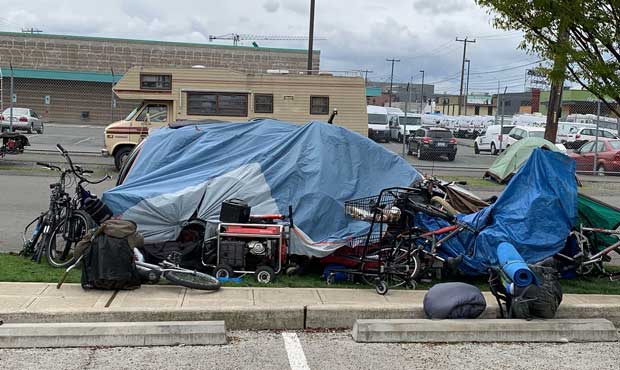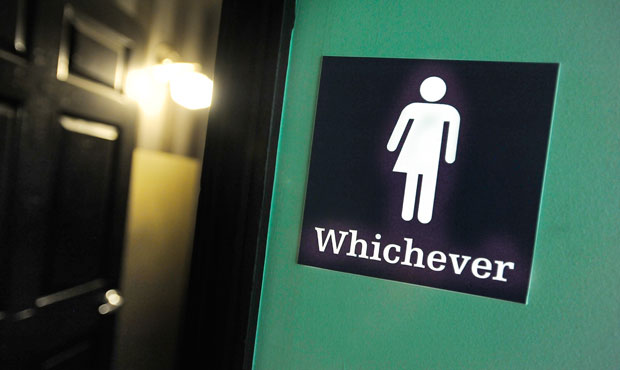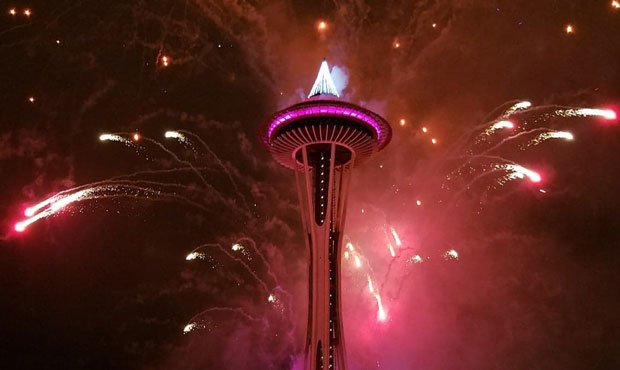Chris Rufo debates causes of the homelessness crisis
Jun 19, 2019, 5:11 AM | Updated: Jun 20, 2019, 10:08 am

A homeless encampment on public and private property near NW 46th Street in Seattle. (City of Seattle)
(City of Seattle)
Some people argue that the massive homelessness crisis across America is largely due to lack of affordable housing. Others say that an addiction crisis is driving the problem more than any other factor. This debate is certainly active around Seattle.
Seattle writer and documentary producer Chris Rufo argues the latter. He took his argument on the Candy, Mike, and Todd Show on KIRO Radio.
Seattle homeless count shows who is on the street and why
2019 King County homeless count shows drop in numbers
Rufo recently wrote a column in The New York Post where he argues that the nation’s swelling homelessness problem — more than 100,000 people on the street along the West Coast — has little to do with housing, and more to do with an addiction crisis.
“The most compelling evidence that I have, that anyone has, is simply go out into the streets, talk with people, volunteer to work with the homeless and you’ll see very quickly what every service provider knows — that in a majority of cases we’re dealing with folks who have severe addictions, and with about 30 percent of cases, people that are suffering from severe mental illness,” Rufo said. “This is data that is really consistent with a lot of the best federal numbers dating back to the 1990s. It’s something that most people know, but for some reason we’ve developed a taboo against it. And people are very hesitant to look the problem in the face and say we have a massive addiction crisis that is driving homelessness more than any other single factor.”
Mike Lewis is skeptical. He looks at the same data and information that Rufo cites in this column and finds it difficult to draw such a strong correlation. He points to reporters from the Los Angeles Times who have deeply investigated the homelessness crisis. He says they have concluded, that while drugs do contribute to homelessness, the lack of Section 8 housing is also a major factor — leading one to conclude that affordability is also a correlating factor. Not to mention mental health issues.
That may be true to an extent, Rufo said. But still, he argues that half of all opioid addicts in the region are homeless.
“That comes from the lawsuit from King County and the city of Seattle versus Perdue Pharma,” Rufo said. “That’s what’s called contingent probability … and if you look at any other statistics, if you are poor, you actually have a very low percentage chance of being homeless. If you go through any of the things people say are the true cause, you see that nothing in the actual analysis comes close to that.”
“If you listen to the Navigation Teams, people who spend every day out in the illegal encampments, out in the city, dealing with the people,” he continued. “They estimate that 80 percent of the people who are unsheltered — sleeping in tents, RVs, cars – 80 percent have substance abuse disorders. And that virtually every encampment they clean up had discarded hypodermic needles for heroin, fentanyl and methamphetamines.”
But that’s not causal, Lewis points out. A person could conceivably become homeless first and then gain an addiction. Rufo argues that evidence supports his view. He says the average addict spends about $1,800 a month on drugs, while being unemployed.
“You have to think if you are addicted, you have to come up with $1,800 a month to buy heroin and fentanyl, and you have no source of employment,” he said. “You can’t determine causality with 100 percent of certainty. But I think with the overwhelming preponderance of evidence suggest that if people become addicted, there is a high likelihood that they will become homeless, and because they are now homeless and addicted, it makes it that much more difficult to get on their feet and reintegrated into social life.”













